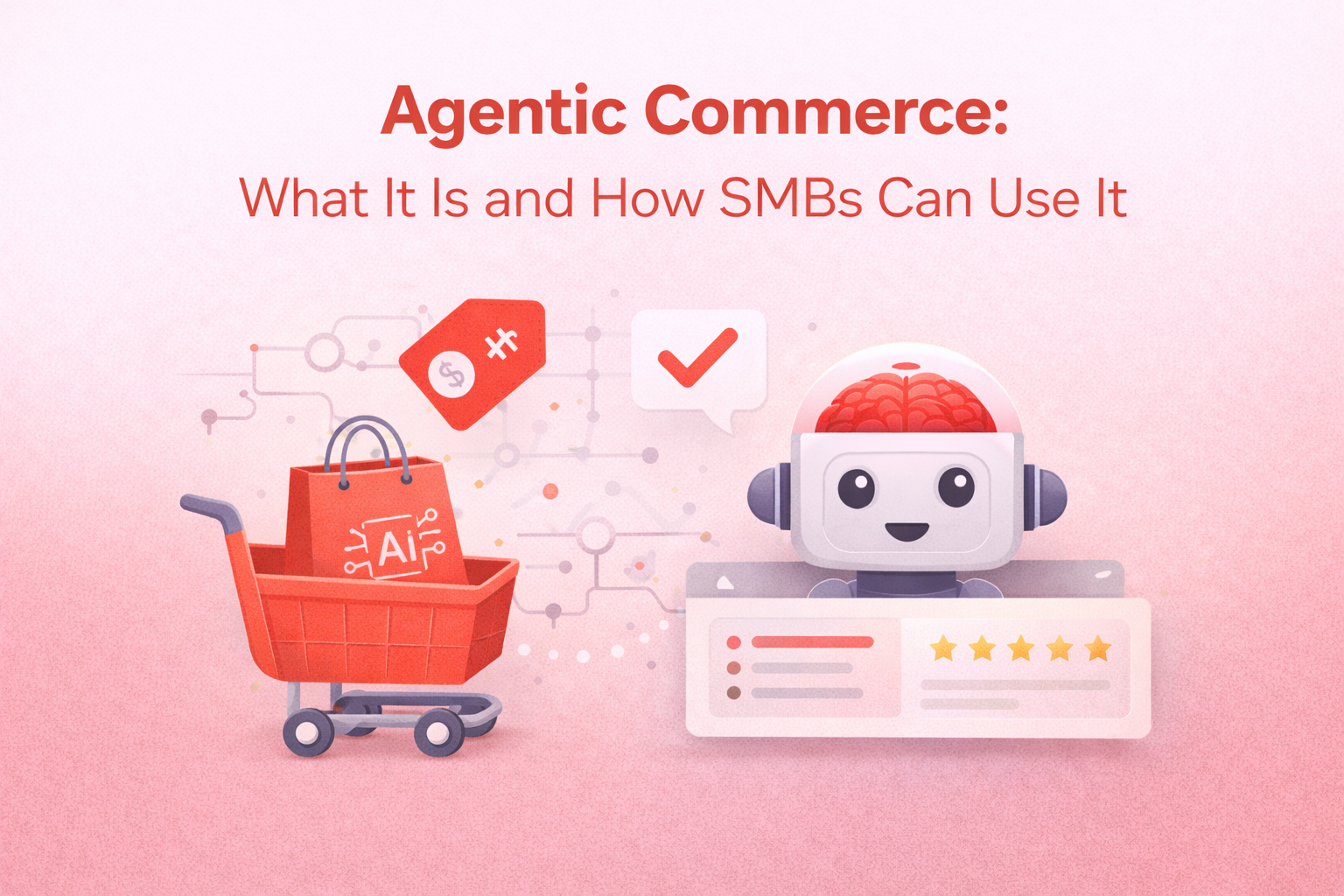Agentic commerce is a new standard that lets AI assistants discover products,
initiate checkout, and pass a secure payment token so customers can buy
without leaving the conversation, while the merchant stays merchant of record.
For SMBs, it means a low-friction sales channel inside AI apps like ChatGPT
that plugs into existing catalogs, payments, and fulfillment systems.
What is agentic commerce
Agentic commerce connects three parties — buyer, AI agent, and business —
through an open protocol so a complete purchase can happen in-chat with secure
credential delegation. The merchant continues to control pricing, tax, fraud
checks, and post-purchase support, preserving the direct customer
relationship.
How it works at a glance
-
Discovery: Your products are indexed via a structured feed that the AI can understand and rank during conversations.
-
Checkout: The AI creates a checkout session against your endpoints to validate items, totals, tax, and shipping before order creation.
-
Payment: A delegated or shared payment token flows to your payment processor for auth and capture—no raw card data in the AI.
Why it matters for SMBs
-
Reduced friction: Customers can ask, compare, and buy in one place, increasing conversion on mobile and chat-first journeys.
-
Keep ownership: You remain merchant of record, control approvals, and handle fulfillment, refunds, and support.
-
Open ecosystem: The protocol is open and designed to work across platforms and payment providers as adoption grows.
Current ecosystem and momentum
Open implementations power in-chat Instant Checkout in ChatGPT, with payment
partners like Stripe live and others announcing support. This momentum signals
a durable shift from search-and-click to conversational buying across
categories.
What SMBs need to implement
-
Product feed: Provide IDs, titles, descriptions, images, price, availability, and variants in the documented schema. Keep it fresh.
-
Checkout endpoints: Expose APIs that create/confirm checkout, calculate totals and tax, and return order status.
-
Delegated payments: Use a compatible PSP that supports tokenized charge requests from AI agents.
Step-by-step setup for SMBs
-
Assess readiness
-
Confirm reliable payment processing, tax calculation, shipping, and returns flows to avoid post-purchase friction.
-
Identify your stack (Shopify/Etsy vs custom) and PSP support for delegated tokens.
-
Prepare your product feed
-
Map catalog fields to the spec; include clear titles, plain-language descriptions, attributes, images, and real-time stock and price.
-
Schedule frequent updates; stale price or inventory can block checkout or hurt ranking.
-
Implement or connect checkout
-
If your platform offers a native connection, enable it and verify tax, shipping, and discounts.
-
For custom stacks, add endpoints for session creation, validation, and order confirmation per protocol docs.
-
Enable delegated payments
-
Configure your PSP to accept a one-time payment token from the AI and perform auth/capture in your environment.
-
Test edge cases: AVS/CVV mismatches, 3DS or SCA flows, partial captures, and refunds.
-
Test end-to-end
-
Run sandbox orders from discovery through fulfillment; verify OMS entries, emails, tax rounding, and refund behavior.
-
Monitor logs for latency in pricing, stock, and tax services, which can degrade chat experience.
-
Launch and monitor
-
Track conversion, declines, cancellations, and customer support themes to refine feeds and policies.
-
Iterate content so the AI can match buyer intents like materials, fit, use cases, and constraints.
Practical use cases for SMBs
-
DTC brands: Sell top SKUs directly in chat with rich sizing, materials, and compatibility attributes surfaced conversationally.
-
Etsy/handmade shops: Showcase unique items with detailed attributes; accept payment without sending buyers off-platform.
-
Services and digital goods: Offer bookings, downloads, or subscriptions through the same delegated payment flow.
Optimization tips
-
Write for conversations: Use titles and descriptions that mirror how customers ask (e.g., “carry-on backpack under 40L with laptop sleeve”).
-
Structure variants: Expose size, color, and SKU-level stock so the AI can resolve choices without back-and-forth.
-
Clarify policies: Publish concise shipping, return, and warranty terms to reduce abandonment and post-purchase tickets.
Compliance, trust, and control
The protocol is designed so merchants can accept or decline transactions per
agent or per order, maintaining fraud posture and brand standards. Sensitive
payment data is exchanged as tokens, aligning with modern compliance
requirements.
Getting started checklist
-
Map catalog to the product feed spec and schedule frequent updates.
-
Stand up checkout endpoints or enable your platform integration.
-
Confirm your PSP supports delegated tokens and test auth/capture/refunds.
-
Run full test orders, then launch with monitoring and quick iteration loops.


